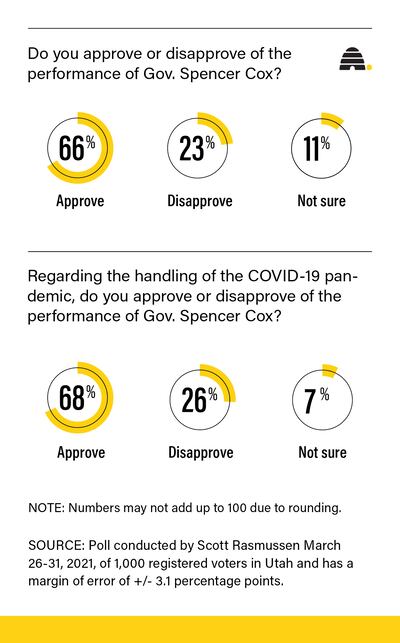Gov. Spencer Cox’s job approval ratings are still climbing, from Republicans and Democrats alike.
A new Deseret News/Hinckley Institute of Politics poll found 66% of Utahns approve of Cox’s job performance, up from 63% in a February poll. Of those, 24% said they strongly approve and 42% saying they somewhat approve. That’s while only 23% say they disapprove, with 15% saying they somewhat disapprove and only 8% strongly disapproving.

About 11% of Utahns say they’re still unsure how they feel about the new Utah governor, who has now been on the job for about four months.
Pollster Scott Rasmussen conducted the survey of 1,000 Utah registered voters March 26-31 for the Deseret News and the University of Utah’s Hinckley Institute of Politics. Poll questions asked of the full sample have a margin of error of plus or minus 3.1 percentage points.
The now three polls on Cox’s performance show he’s continuing an upward trajectory in approval from Utahns in the early months of his governorship, even as he navigates the tricky political climate of the COVID-19 pandemic.
“Every month since Gov. Cox has taken office, his approval ratings have increased,” said Jason Perry, director of the University of Utah’s Hinckley Institute. “His disapprovals are staying about the same, but of note is the number of people who are unsure about him has gone down. And most of the people who are no longer unsure are falling into the ‘approve’ category.”
Cox is also winning approval from not just his own Republican party, but also Democrats and unaffiliated voters.
Of the 70% of Republicans who approve of Cox, 29% said they strongly approve and 41% said they somewhat approve. Of the 20% who said they disapprove, 13% said they somewhat disapprove and 7% said they strongly disapprove. About 9% of Republicans are undecided about Cox.
As for Democrats, 64% approve of Cox, with 29% saying they strongly approve and 44% saying they somewhat approve. Only 25% of Democrats say they disapprove of the new governor, with 19% saying they somewhat disapprove and only 6% saying they strongly disapprove. About 11% of Democrats still aren’t sure what they think about Cox.
For unaffiliated Utah voters, 62% approve of Cox, with 21% who strongly approve and 41% who somewhat approve. Only 24% said they disapprove, with 14% who somewhat disapprove and 10% who strongly disapprove. More unaffiliated voters, however, still haven’t made up their mind about him, with 13% unsure.
Those figures show Cox is “striking a balance across party lines,” Perry said.
“It’s rare to see a Republican governor have such high approval among not just his own party, but from Democrats and unaffiliated (voters) as well,” Perry said.
Cox’s handling of the pandemic is likely still at the core of his high approval ratings, Perry said. Utah’s vaccination rollout hasn’t hit any major snags, and Cox seems to have navigated the tricky topic of when to ease back on COVID-19 restrictions, including the lifting of the statewide mask mandate April 10, without upsetting any major factions of Utahns.
Slightly more Utahns say they approve of Cox’s handling of the COVID-19 pandemic: 68%. Of those, 31% said they strongly approve, and 37% said they somewhat approve. Only 26% of Utahns said they disapprove of Cox’s handling of COVID-19. About 7% said they aren’t sure.
“He’s walking a very fragile line very well right now,” Perry said.
Approval across party lines for Cox may also show Utahns are viewing the pandemic as something that’s bigger than politics, he added.
“When it comes to the vaccines as well as the safety of our families here in the state, that’s a bigger issue than party itself,” Perry said. “At this point in time, party doesn’t seem to be the relevant issue.”


